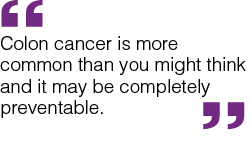
Your spouse, your friends, your grandchildren—your inspiration to stay healthy comes in many forms. March is colon cancer awareness month, and it’s something worth really thinking about.
If you are a nonsmoking woman, there are only two cancers likely to end your life prematurely: breast cancer and colon cancer. Likewise, if you are a nonsmoking man, the two cancers most likely to kill you are prostate cancer and colon cancer.
Screening
Colonoscopy, with its ability to identify and remove the precursor polyps before they have a chance to turn cancerous, is truly life-saving. Recent studies have suggested that more than 80% of colon cancers can be prevented through screening colonoscopy programs, reducing the likelihood of death from colon cancer by 90%.

What about Cologuard?
You may have heard about Cologuard, an at-home stool test that is an alternative to colonoscopy. Does this mean that you don’t need to get a colonoscopy anymore?
Not exactly. While at-home stool tests can be used to screen stool for signs of bleeding as a marker for cancer, these options lack the accuracy or thoroughness of traditional colonoscopy. Importantly, they also aren’t likely to find polyps before they turn into colon cancer. If the test comes back positive, you will still need to have a colonoscopy to remove the polyps.
At-home tests are valuable for people in rural areas who otherwise don’t have access to colonoscopy screening or have disabilities that prevent them from having the procedure.
Make sure you get your colonoscopy when you need to. See our screening guidelines below to know when you need to start
getting screened.
Colonoscopy Screening Guidelines:
- For most people without other pre-existing risk factors, screening should start at age 50 with follow up every 10 years.
- If your doctor finds polyps, your follow up exam may need to be more frequent.
- If you are African American, you should have your first exam at age 45.
- If you have a family history of colon cancer, especially in a first-degree relative (parent, sibling or child), you may need to have your colonoscopy beginning at an even earlier age.
Get Screened Today
Your colonoscopy is likely to be fully covered by your insurance, so there’s no reason to wait. Visit us online to request your screening appointment today.